It is overland tour to Mt. Wudangshan in Hubei province from Xian. Hubei province is located in mid China connecting many provinces in China by convenient transportation of railway, cruise, and flights......
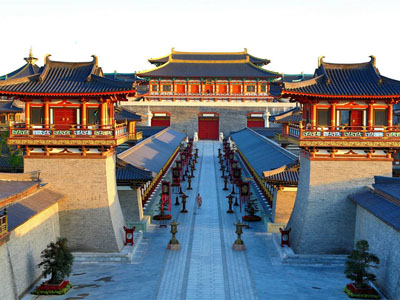
Chinese opera falls into more than 300 forms of traditional operas, of which Peking Opera is the most popular. Peking Opera evolved from Kunqu Opera, an even more ancient art of drama listed by UNESCO in 2001 among the first group of works representing humankind through oral history.
Other popular local operas include Yueju (Shaoxing Opera from Zhejiang ), Huangmeixi (from Anhui ), Chuanju ( Sichuan Opera), Yuju ( Henan Opera), and Yueju ( Guangdong Opera). Peking Opera developed in early 19th-century Beijing and presents singing, music, chanting, dancing and martial arts all in one stage performance. The dramatic masks and costumes of Peking Opera are world-renowned. Famous Peking Opera actors and actresses over the years included Mei Lanfang, Cheng Yanqiu, Ma Lianliang, Zhou Xinfang and Du Jinfang.
Since 1990s, the emergence of highly talented young performers has helped demonstrate the continued importance of Peking Opera in Chinese culture. In recent years, the Peking Opera Theatre of China has experimented with incorporating western symphonic music in its productions.
Peking Opera, which originated in the late 18th century, is a synthesis of music, dance, art and acrobatics. It is the most influential and representative of all operas in China .
Peking Opera can be divided into "civil" pieces characterized by singing, and "martial" ones featuring acrobatics and stunts. Some operas are a combination of both.
The operatic dialogue and monologues are recited in Beijing dialect, and some of the words are pronounced in a special fashion, unique to the opera.
Peking Opera has "chang"(singing),"nian"(dialogue),"zuo"(acting)and "da"(martial arts) as its basic performing forms."chang" is mainly performed in the tunes of "xipi"(used for expressing strong emotions) and "erhuang"(used for expressing deep and sorrowful feelings)."Nian" is mainly done in the tones of "yun bai" and "jing bai"."Zuo" means the body movements (dancing and acting) of the actor or actress."Da" is the martial art with acrobatic actions.
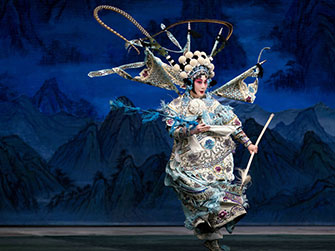
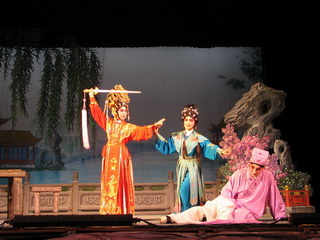
The music of Peking opera is that of the "plate and cavity style".Its melody with harmonious rhythms is graceful and pleasing to the ears. The melody may be classified into two groups: "Xipi" and "erhong", guiding pattern, original pattern, slow pattern, quick pattern, desultory pattern being their chief patterns. The performance is accompanied by a tune played on wind instruments, percussion instruments and stringed instruments, the chief musical instruments being jinghu (a two-stringed bowed instrument with a high register), yueqin( a four-stringed plucked instrument with a full-moon-shaped sound box), Sanxian( a three-stringed plucked instrument), suona horn, flute drum, big-gong, cymbals, small-gong, etc.
China has an abundance of 1,300 local operas, Sichuan opera is one of the China1s oldest local operas and is popular in Sichuan province and some regions of Yunnan and Guizhou provinces. It is the most significant and most interesting opera form from Southwestern China. As a stage entertainment,it conveys the idea of time and space to the audience through performances. the opera is characterized by its unique solo singing,refined acting,rich percussion and irresistibly funny comedians, Sichuan opera also displays its unique skills: the changing faces, spitting fire, and rolling light. Numerous Sichuan opera troupes are active throughout the province, both in the countryside and in the cities.The troupes in Chengdu are rate artistically top level.
The face changing, or "bianlian" in Chinese,is an important intangible cultural heritage in China . only a few masters have grasped this skill. they know how to change Sichuan Opera masks in magically quick succession. As they flourish their arms and twist their heads, their painted masks change again and again and again.
Kunqu Opera, in its development, had different kinds of names, such as kunqiang ,kun tune, kunqu, and so on. Generally speaking, kunqiang is used to express tunes of the opera, and kunqu is used to express oratorio(宗教剧), while kunqu opera is a kind of opera that means performance arts.
Kunqu Opera is a comprehensive art that combines singing, dancing, narrating, and acting. The literature, music, and dance of Chinese opera were all perfected and enhanced in the development of Kunqu Opera.
Qinqiang Opera is a local Chinese opera that mainly thrives in North China's Shanxi Province, as well as its neighboring northwestern regions, like Gansu and Qinghai provinces and the Ningxia Hui and Xinjiang Uygur autonomous regions.
Huangmei Opera was originally called "Huangmei tune" or "tea-picking opera." It was a folk opera that was formed in the regions of Anhui, Hubei, and Jiangxi at the end of the 18th century. One of the brands shifted to Huaining County, which was the center of Anqing, and mixed with its local art, using its local language to sing and narrate.
Chinese opera evolved from folk songs, dances, talking, antimasque(滑稽戏), and especially distinctive dialectical (方言的)music. Gradually it combined music, art and literature into one performance on the stage. For Chinese, especially older folks, to listen to this kind of opera is a real pleasure. I hope our students enjoy it too.
Related Tours
Chinese Mandarin Learning Tour
China Train Tour
18 Days Ancient China Culture Tours

It is overland tour to Mt. Wudangshan in Hubei province from Xian. Hubei province is located in mid China connecting many provinces in China by convenient transportation of railway, cruise, and flights......
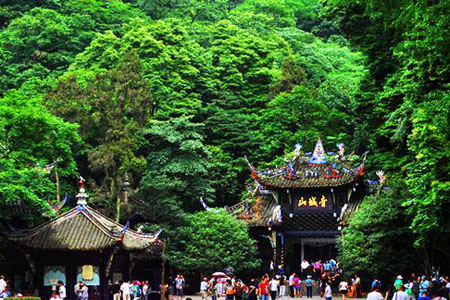
One day classic tours of Chengdu to Mt. Qingchengshan and Dujiangyan Dam will show tourist the profound of ancient Chinese wisdom and culture in harmony relation with the world. ......
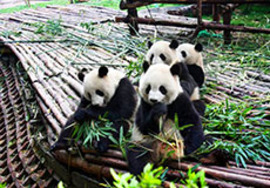
The most classic one day Chengdu tours will bring tourist to Chengdu Giant panda garden and Leshan giant buddha with private travel guide and car in Chengdu, extremely convenient and easy!......
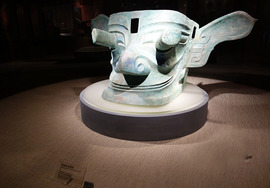
One days best Chengdu tours bring tourist to Sanxingdui museum and giant panda garden with private guide and car, making your tour in Chengdu easy. ......
This panda volunteer work provide tourist with one days unique experience of Panda volunteer project works and bring them an intimate touch with Giant pandas, also the best way to learn deep about pand......
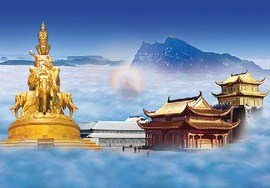
It is tour from the only one operator in Chengdu tours market offering Emeishan and Leshan tours by bullet train. Our highlights including Leshan Giant Buddha and Mt Emeishan. ......

